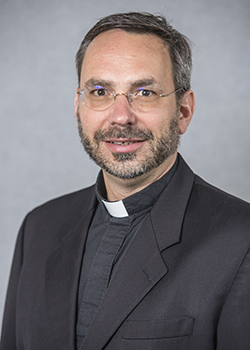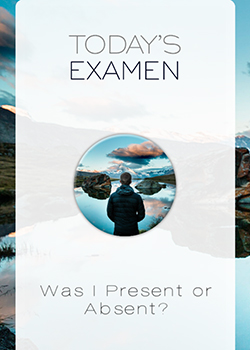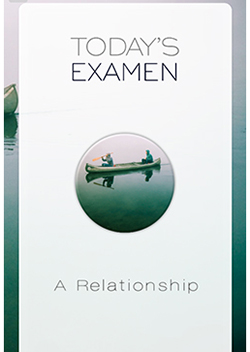
By Cheryl Wittenauer
As a Jesuit for 28 years, Fr. Mark Thibodeaux is well practiced in the Examen, Saint Ignatius Loyola’s five-step meditation and prayer, a 500-year-old spiritual tool for examining the day and finding where God has been in it.
Through the five steps, practitioners give thanks for God’s love; pray to understand God’s acting in one’s life; review the day, recalling specific moments and feelings; reflect on actions, words and thoughts, and drawing closer or moving further from God; and look to the next day. Or, in Fr. Thibodeaux’s mnemonic: Relish, Request, Review, Repent, and Resolve.
It’s all pretty straightforward. But Fr. Thibodeaux said that he and people he counseled sometimes found that following the steps of the Examen twice a day, day in and day out, became a rote exercise, and not as spiritually productive as perhaps Ignatius had intended.
 So Fr. Thibodeaux, novice director for the Jesuits' USA Central and Southern Province, wrote the book, Reimagining the Ignatian Examen, which takes readers through 34
different routes to the same place: look over your day through a set of
questions, ask for forgiveness, and look to tomorrow.
So Fr. Thibodeaux, novice director for the Jesuits' USA Central and Southern Province, wrote the book, Reimagining the Ignatian Examen, which takes readers through 34
different routes to the same place: look over your day through a set of
questions, ask for forgiveness, and look to tomorrow.
When Fr. Thibodeaux approached Loyola Press in Chicago with an idea for a manuscript, he said he’d like there to be an accompanying app for the benefit of those who prefer to pray the Examen on a digital device. The editorial team at Loyola Press designed and created the app, and Fr. Thibodeaux tested it and made suggestions until he was satisfied.
The book, small enough for a pocket or purse, was published in 2015; the app of the same name was released last month. The app can be downloaded for free on iTunes or Google Play.
“The idea of the book and app is to constantly have different questions,” Fr. Thibodeaux said. “I did my own crude app years ago for doing my own Examen and came up with 34 options,” one for each day of the month and a few more.
On the app, each day’s Examen has six to eight slides with questions to contemplate and answer.
For instance, one of the 34 asks, “Am I Free or Unfree?” The slides take the meditator through an introduction of what it means to be spiritually free or “unfree,” when, Fr. Thibodeaux said, negative emotions get the better of a person. Subsequent steps help the meditator make God’s presence known in the moment, express gratitude, recall the “unfree” moments of anxiety and discouragement, seek healing, and recall the most “free,” grace-filled moments of the day.
Another option leads the meditator through ponderings about healthy and unhealthy daily habits and shifts in spirit.
There’s even one that asks: “Am I Ready to Die Today?”
 “Knowing that God is all-loving, are you ready
to join him in heaven?” Fr. Thibodeaux asked. “If I knew I was going to die today,
what would I want to do to be ready, to prepare for death?
“Knowing that God is all-loving, are you ready
to join him in heaven?” Fr. Thibodeaux asked. “If I knew I was going to die today,
what would I want to do to be ready, to prepare for death?
“The prompts lead you to reflect on your life, to talk to God about it. It has a slightly different set of questions with a different perspective.”
Rosemary Lane, who helped design and create the app, said this customized prayer experience is tailored to individual needs, moods, and situations.
“Users can choose from more than 30 guided reflections about relationships, pending decisions, or forgiveness, or select that day’s allotted Examen,” she said. “With soothing music and step-by-step guidance, users are invited to review their current state of being and bring God into their nitty-gritty, wherever they are. It is our hope that the app, which can be used daily, will help users gain insight, mindfulness, and a closer relationship with God.”
Reimagning the Examen is available through the App Store. For more information, visit the Reimagning the Examen website. For more information about Reimagining the Examen, visit Loyola Press.